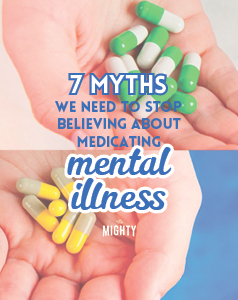You get sick. You go to the doctor. The doctor tells you how to treat it. You treat it — right?
For mental illness, it’s not always that simple. Treatment can involve a lot of factors, including finding a therapist who works for you, changing up your routine and sometimes, finding the right combination of medication. And whether it’s self-imposed or from friends or family, the stigma surrounding medicating mental illness can be another hurdle, making people feel like using this treatment option is somehow “giving up.”
But treatment is treatment, and although finding the right medication can be complicated, you should never be ashamed of how you treat your illness. To learn more, we asked our community to tell us what they think are the biggest misconceptions about treating mental illness with medication.
Here are some myths they want you to stop believing:
Myth #1: It’s the easy way out.
“Finding the right medications and taking them properly is a huge commitment of time and effort. It’s not as simple as just popping a pill, folks.” — Cary Rice Schwent
“Nothing about depression and anxiety is easy. I still have days where I don’t want to get out of bed. I still suffer from anxiety. But I tried fixing things on my own and it almost killed me. Medication saved my life.” — Keisha Defliger
“Medication is not a cop-out; it’s only one of many tools in my arsenal to get by day to day.” — Kira Schoultz
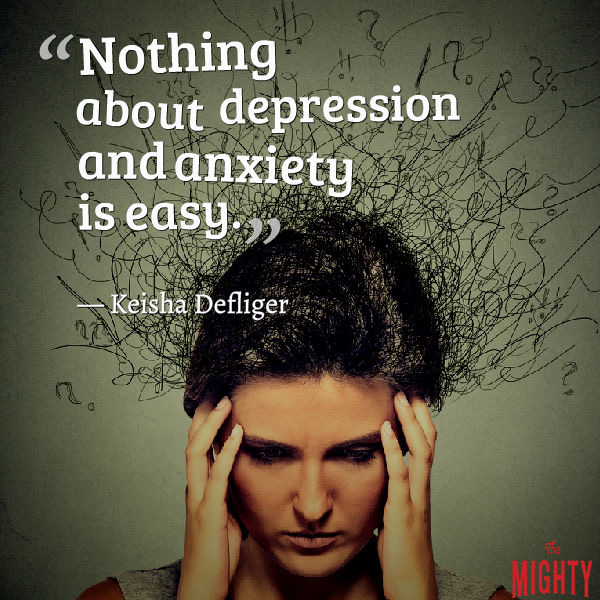
Myth #2: It’s different than taking medication for a physical illness.
“For many types of mental illness, medication is no different from a diabetic taking insulin. If you have an imbalance, you have an imbalance, whether it’s in your brain or somewhere else in your body. It’s OK to need medication.” — Delaina Conour
“People think I should be able to handle my illnesses without medicine. In reality, without medicine, my illnesses would handle me.” — Sarah Ceasar
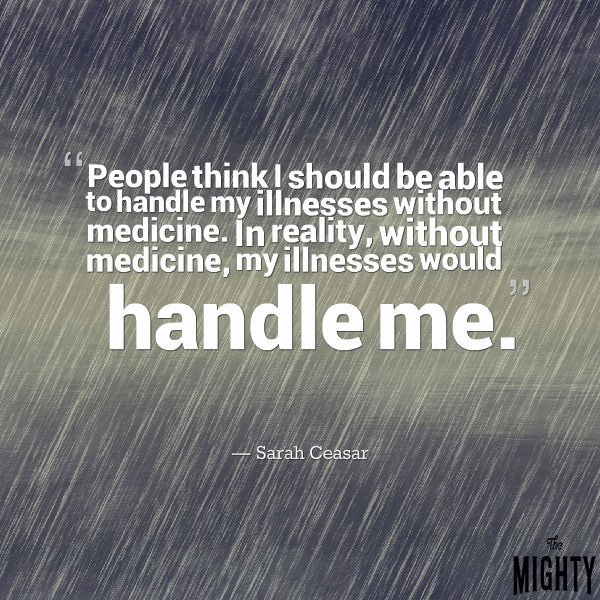
Myth #3: When you’re having a bad day, it always means you “forgot to take your medication.”
“I’m allowed to have bad days. Too often I get asked on a bad day if I’m taking my meds. It’s just assumed the medications fix everything. Bad days happen no matter how religiously medications are taken.” — Heather East Tenney
“I frequently get asked if I forgot to take my meds when all I’m doing is behaving in a reasonable and valid way. It’s almost as if people think the purpose of my meds is to make me docile and complacent.” — Jessica Love
“Some people think if you’re taking medication you’re cured and have no excuse to have anxiety or to be in a bad mood. Well, nobody is perfect and we all have bad days.” — Tina Frotton Hinebaugh
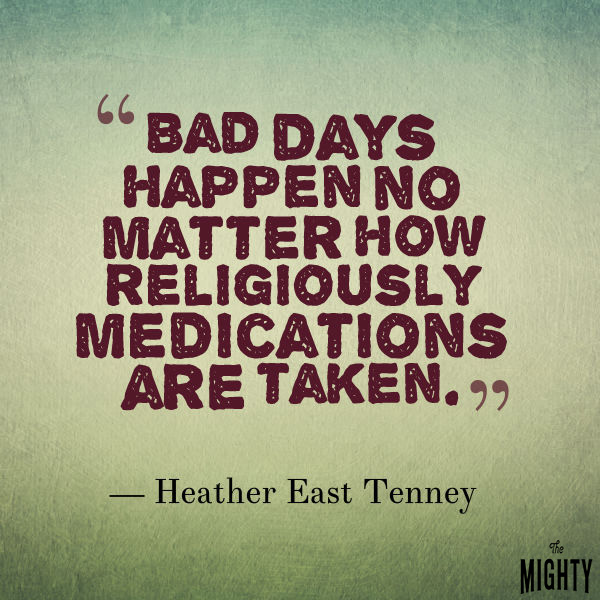
Myth #4: Medication changes your identity.
“My meds relieve my symptoms so I can be myself.” — Natalie Tam
“People say, ‘Medication will make you a zombie.’ Wrong. My son is completely withdrawn without his medication. Medication keeps him with us.” — Tammy Harbert
“I was more of a ‘zombie’ before finding the right medication. Now, I’m living my life. These medications helped me to think my own thoughts, be my own person, and live my own life, without all of the thoughts, obsessions, etc. of my various disorders slowing me down and distracting me.” — Rachel N
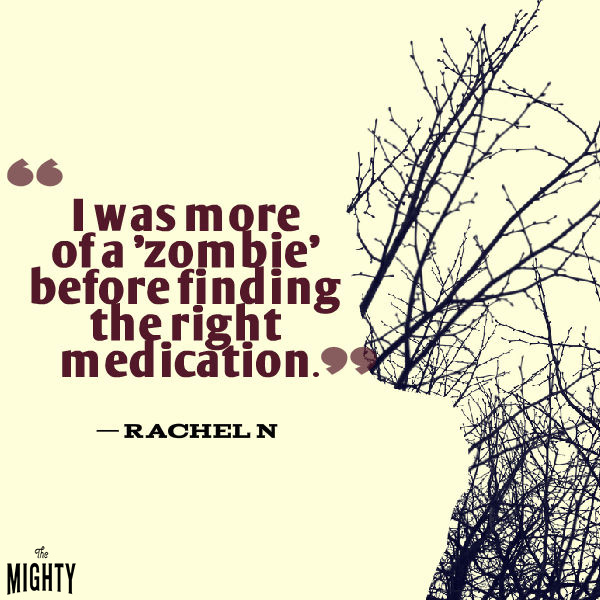
Myth #5: When you start taking medication, your recovery “work” is done.
“Therapy helps, meds help. I need both to recover.” — Carolina Ledezma Carrasco
“I don’t chose medication instead of therapy or prayer or anything else you might suggest. Usually, I’ve tried all of the above. I stick with what works, which means a combination of things.” — Allie Wills
“I feel people assume my ADHD and anxiety medications are a ‘magic fix’ for my symptoms. They play a role, but it’s my choice to go the extra mile with therapy and organizational effort.” — Danielle Bailey
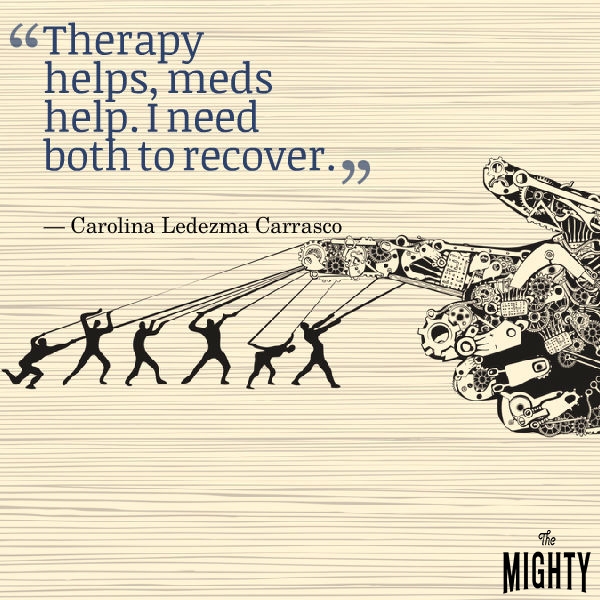
Myth #6: They’re all “happy pills.”
“Taking medicine for depression and anxiety doesn’t make me happy all the time. They just reduce the trigger threshold for my anxiety and make my lows not so low.” — Tabi Baker
“Nope. It’s more like a ‘sometimes I feel not-so-doomed’ pill.” — Kristin Lara
“Sometimes, there’s no ‘fixing’ mental illness. There’s functioning and surviving it.” — Emily Perkins
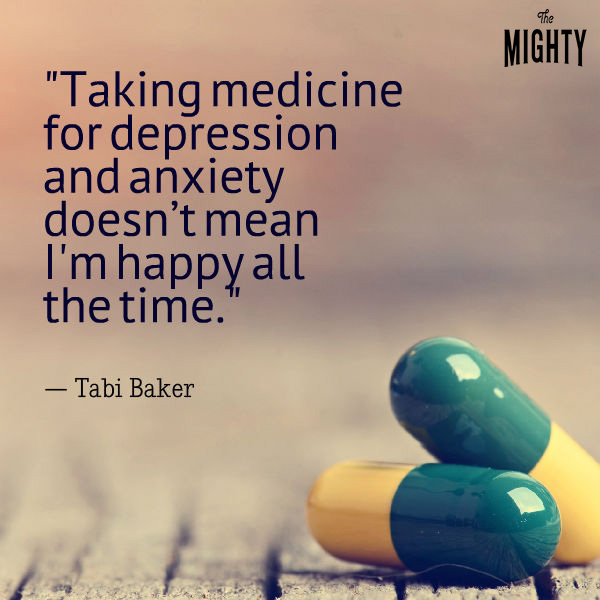
Myth #7: Taking medication makes you weak.
“Taking medication for mental illness isn’t a sign of weakness; it’s a sign of strength. Taking care of yourself is always a good thing.” — Lisa Gray Stephens
“I’m constantly being told to ‘tough it out’ or that I need to ‘try harder.’ That I’m using them to cope instead of ‘learning how to handle normal emotions.’” — Tiffany Ball
“Taking medication isn’t my weakness, it’s what I do to help myself feel strong again.” — Arielle Smith
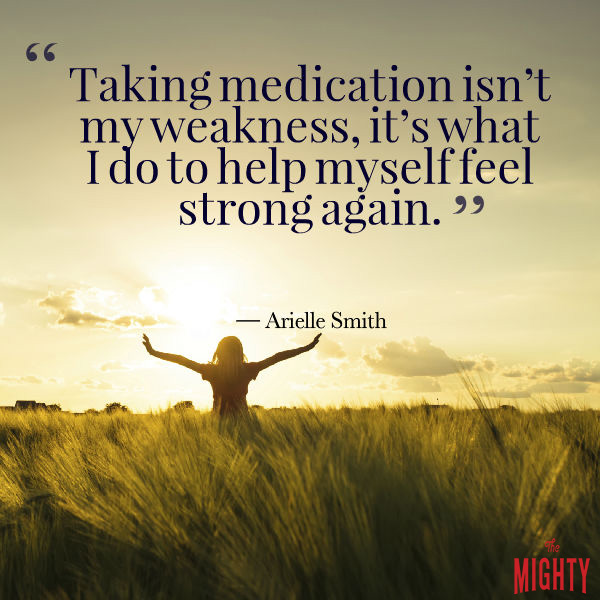
*Some answers have been edited and shortened
Editor’s note: These answers are based on personal experience and shouldn’t be taken as professional advice. Talk to your doctor before starting on any medication.
Related: 18 Messages for People Who View Medicating Mental Illness as a Weakness


